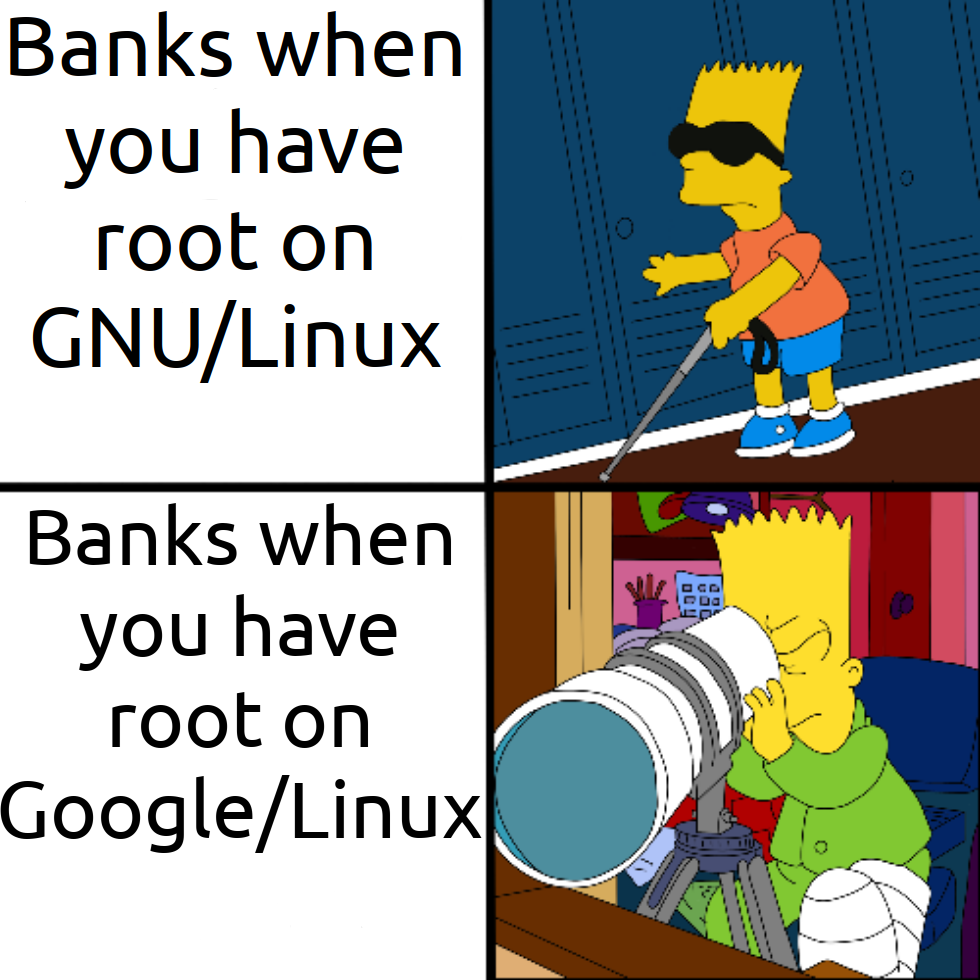this post was submitted on 04 Apr 2024
1023 points (98.8% liked)
linuxmemes
26057 readers
1771 users here now
Hint: :q!
Sister communities:
Community rules (click to expand)
1. Follow the site-wide rules
- Instance-wide TOS: https://legal.lemmy.world/tos/
- Lemmy code of conduct: https://join-lemmy.org/docs/code_of_conduct.html
2. Be civil
- Understand the difference between a joke and an insult.
- Do not harrass or attack users for any reason. This includes using blanket terms, like "every user of thing".
- Don't get baited into back-and-forth insults. We are not animals.
- Leave remarks of "peasantry" to the PCMR community. If you dislike an OS/service/application, attack the thing you dislike, not the individuals who use it. Some people may not have a choice.
- Bigotry will not be tolerated.
3. Post Linux-related content
- Including Unix and BSD.
- Non-Linux content is acceptable as long as it makes a reference to Linux. For example, the poorly made mockery of
sudoin Windows. - No porn, no politics, no trolling or ragebaiting.
4. No recent reposts
- Everybody uses Arch btw, can't quit Vim, <loves/tolerates/hates> systemd, and wants to interject for a moment. You can stop now.
5. 🇬🇧 Language/язык/Sprache
- This is primarily an English-speaking community. 🇬🇧🇦🇺🇺🇸
- Comments written in other languages are allowed.
- The substance of a post should be comprehensible for people who only speak English.
- Titles and post bodies written in other languages will be allowed, but only as long as the above rule is observed.
6. (NEW!) Regarding public figures
We all have our opinions, and certain public figures can be divisive. Keep in mind that this is a community for memes and light-hearted fun, not for airing grievances or leveling accusations. - Keep discussions polite and free of disparagement.
- We are never in possession of all of the facts. Defamatory comments will not be tolerated.
- Discussions that get too heated will be locked and offending comments removed.
Please report posts and comments that break these rules!
Important: never execute code or follow advice that you don't understand or can't verify, especially here. The word of the day is credibility. This is a meme community -- even the most helpful comments might just be shitposts that can damage your system. Be aware, be smart, don't remove France.
founded 2 years ago
MODERATORS
you are viewing a single comment's thread
view the rest of the comments
view the rest of the comments

Isn't saying that allowing apps to have root lets them access anything just describing what root is? A rooted phone doesn't have to give superuser access to every app.
Sure, but apps that run as superuser can access anything, including the data and memory for banking apps. A big part of Android's security model is that each app runs as a different user and can't touch data that's exclusively owned by another user.
It just means you need to trust apps that you give root access to, or only give elevated privileges during the very specific times when apps need them. Root isn't something people who don't know what they're doing should be messing around with, I guess. But I'd think a lot of people who root their phone know and accept the risks.
People like you or I may know what we're doing with a rooted device, but I think the issue for the banks is that they can't guarantee that someone with a rooted phone knows what they're doing or isn't using a malicious app, so they have to be cautious and block all rooted phones.
An app that requires root may look like a normal app but it could be a trojan that modifies banking apps in the background (eg patches them on disk or in RAM so transfers done through the app go to a different recipient). There's been malicious apps in the Play Store in the past, and rooted apps have way less oversight - some are literally just APK files attached to XDA-Developers posts or random blog sites.
I take your point, and I'm sure you're right about the banks' rationale, but in my own view it does not seem like it should be the banks' decision to make.
As soon as a bank offers any sort of fraud protection, though, security becomes a bank issue (in addition to a "you" issue).
Not at all saying I agree with the banks on this, but I think that may be part of the thinking.
This is a good point. The bank needs to do as much as they can to reduce fraud risk, and they've probably found some correlation between rooted phones and a higher likelihood of fraudulent transactions. Some banks block VPNs for a similar reason - when logging in from a VPN, it's harder for them to tell that it's actually you vs if it's an attacker that uses the same VPN service as you.
Your risk exposure is that you could lose your bank account balance. The banks risk exposure is that they could lose every bank account balance exploited by the same rooted phone vulnerability. So they evaluate risk differently than you do.
bro I gave my nana root on her eye phone and by the end of the week she had hacked half of North Korea - the other half thought her actions were a good example of juche ideals. It was crazy ngl
No, but it can.